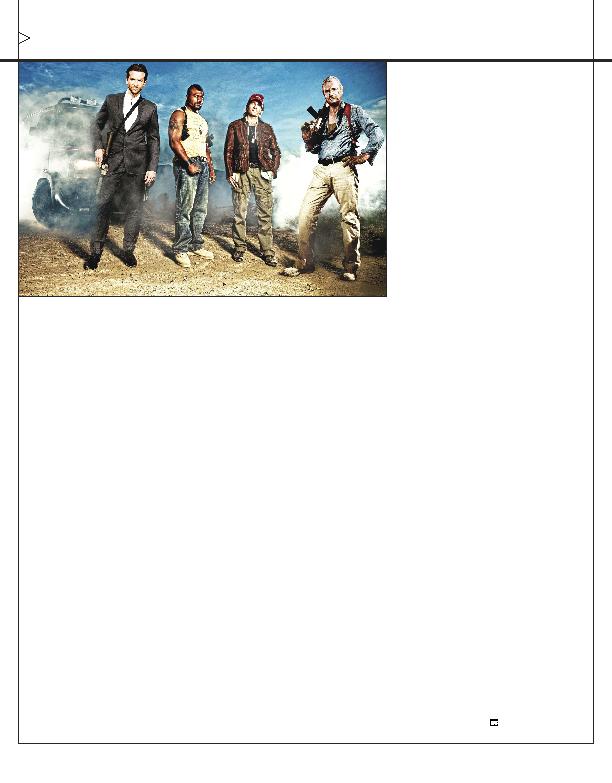
young actor in Sergio Leone's Once Upon a
Time in America, Bloom grew up in Hollywood
and can remember being on the Universal lot
when episodes of Stephen J. Cannell's series
were being filmed. "I believe I was around
when the pilot was being shot," he says. He'd
always been interested in writing, but never
thought of passing his material to anyone out-
side his circle of friends. It wasn't until he be-
came friends with writer-director Joe
Carnahan (Smokin' Aces) that he started to
consider writing as a career. "He began to en-
courage me to, let's say, come out of the closet
with this writing," Bloom chuckles. "We
started working together on a couple of
things, which was great, and here we are."
when Carnahan was approached in early
2009 about taking over The A-Team film.
While numerous versions of the script already
existed from writers Michael Brandt, Derek
Haas (Wanted) and Skip Woods (X-Men Ori-
gins: Wolverine), Carnahan felt they all stayed
too loyal to the original show and didn't ap-
peal to his own sensibilities. He asked Bloom
to join the project and the two men took the
ing with a four-protagonist story and applied
it to their full rewrite of The A-Team. "We did-
n't borrow anything from ourselves," Bloom
clarifies. He points out that juggling four
main characters takes a different skill set than
just one or two, especially with four iconic
characters who deserve equal time in the film
and within the structure of the story.
mer soldiers who had disappeared into the
Los Angeles underground. Both Carnahan
and Bloom were struck by the fact that this
aspect of the team -- their origin as merce-
naries -- was glossed over in that brief pro-
logue. "The promise of that team doing
something intense that related to ending the
war in Vietnam and then they stayed to-
gether in the underground," Bloom muses,
"there's something heavier about that." The
writers realized that to have a potential fran-
chise, these origin events needed to be seen,
not just taken on faith and decided to take
the story back to the beginning -- showing
the men as a closely knit team of special
forces Rangers. "It's an origin story," he says.
"but the entire film doesn't spend its time in
those origins."
han wrote a short story rather than a
traditional outline or treatment. This unusual
approach showed their take on the plot and
the characters and ultimately got them the
go-ahead for a full script. The two writers used
notecards to outline a few scenes of their
screenplay, "but I think there's something to
be said for flying by the seat of your pants,"
Bloom says. "[It helps in] understanding your
characters and understanding your struc-
ture." They continued to shoot ideas back
and forth, fleshing out beats, and had a solid
first draft in less than six weeks. Though there
wasn't an official deadline, both men sensed
the producers' desire to have the screenplay
done now. "This script and our process and
some of the timetables just required a relent-
less togetherness. As much as there's auton-
omy, there's also the studio, the actors, the
budget and the calendar."
forces pull-out has begun and Baghdad is off
limits for all military personnel. However, a
set of U.S. Treasury engraving plates has been
mistakenly left behind and Colonel John
"Hannibal" Smith (Liam Neeson) and his spe-
cial forces Alpha Team are sent on a black op
to retrieve them. The team pulls off the heist
without too many hitches, only to discover
they've been framed for stealing the plates.
With no written orders to validate their mis-
sion, the A-Team is forced to escape and try to
learn who framed them, all while being pur-
sued by a military captain (Jessica Biel), who
has her own ties to the team.
level of action in the film, given that the
show was legendary for its minimal, inoffen-
sive violence. Bloom agrees this was part of
the show's charm. "Sort of the vortex of the
Velveeta," he chuckles. "And that was terrific.
So did we do that in the movie? Let's say our
kill count is a lot more than zero." The screen-
writer makes special note of that number
zero, pointing out that since no one ever died
-- or even bled -- in the show that it's not a
huge leap for the film to be considered more
violent than its source material. Bloom be-
lieves this violence was necessary to portray
the events that set up the A-Team everyone
knows. "We decided to build that bridge for
you," Bloom says. "Hopefully we go over it
together and it's fun."